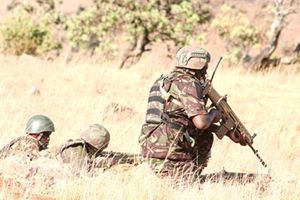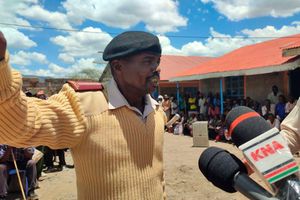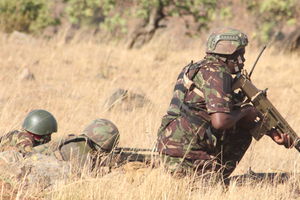
Deserted Centre-One trading centre in Mochongoi, Baringo County.
Rushed funerals. Change of burial sites. Police escorts. This is the nightmare families in Baringo County experience when trying to bury loved ones.
For someone to be buried in the banditry-prone areas, police officers must be present to repulse the criminals in case they strike. They also must accompany the funeral convoy, if any, for the security of the mourners.
Such funerals are also rushed as mourners fear being ambushed, said Richard Chepchomei, an elder from Chemoe village in Baringo.
“When someone is killed by criminals or dies by other causes, it is a nightmare because ferrying the body from the mortuary to the villages is an uphill task,” said Mr Chepchomei. “No burial in these villages takes place without the presence of security officers unless you are gambling with your lives.”
Sometimes bereaved families are forced to change burial sites due to fear of attacks.
Recently, Ezekiel Kipsoi, a resident of Chemoe, who was shot dead by bandits, was buried in the neighbouring Mogotio sub-county as his village is deserted and insecure.
“In our community, if someone dies, he is supposed to be buried in their ancestral land. However, this does not always happen here because of the many of challenges posed by bandits,” said Mr Chepchomei. He added: “The bandits not only kill but also follow up their victims to know where and when they are being buried so that they can cause chaos, maybe to scare locals.”
The challenges were evident on February 29 during the burial of slain head teacher Thomas Kibet in Kagir village in the insecurity-prone Baringo North.
Also Read: State changes tactics in banditry war
Kibet was shot dead by armed criminals on February 10. During his burial, a contingent of security officers comprising the military, Rapid Deployment Unit, General Service Unit and police reservists escorted the body from Kabarnet.
“Such burials take just about 30 minutes ... Sometimes, we conduct them when standing,” said Mr Chepchomei. He added that mourners are also expected to leave as a group so that in case of an attack, the officers are not overwhelmed.
He said security officers deployed to beef up security in such ceremonies control the burial programme, patrolling and informing mourners of the next move. “When they order us to end or fast track, we do so.”
Also Read: Banditry - Ruto chairs security meeting
“When we were going back after the burial of the Kagir teacher, with the use of drones, security officers spotted several bandits waiting to ambush us at the notorious Kamachakwa hill. They instructed us to stop and disembark from our vehicles as they engaged the attackers. We were forced to re-route,” he revealed.
Just before the body of the deceased arrived at his home, armed criminals tried to disrupt the burial, shooting at mourners in an attack that lasted more than 10 minutes
On March 25, 2017, during a mass burial of 11 people killed by armed criminals in Mukutani, Baringo South, bandits stormed the ceremony and started shooting at mourners.












